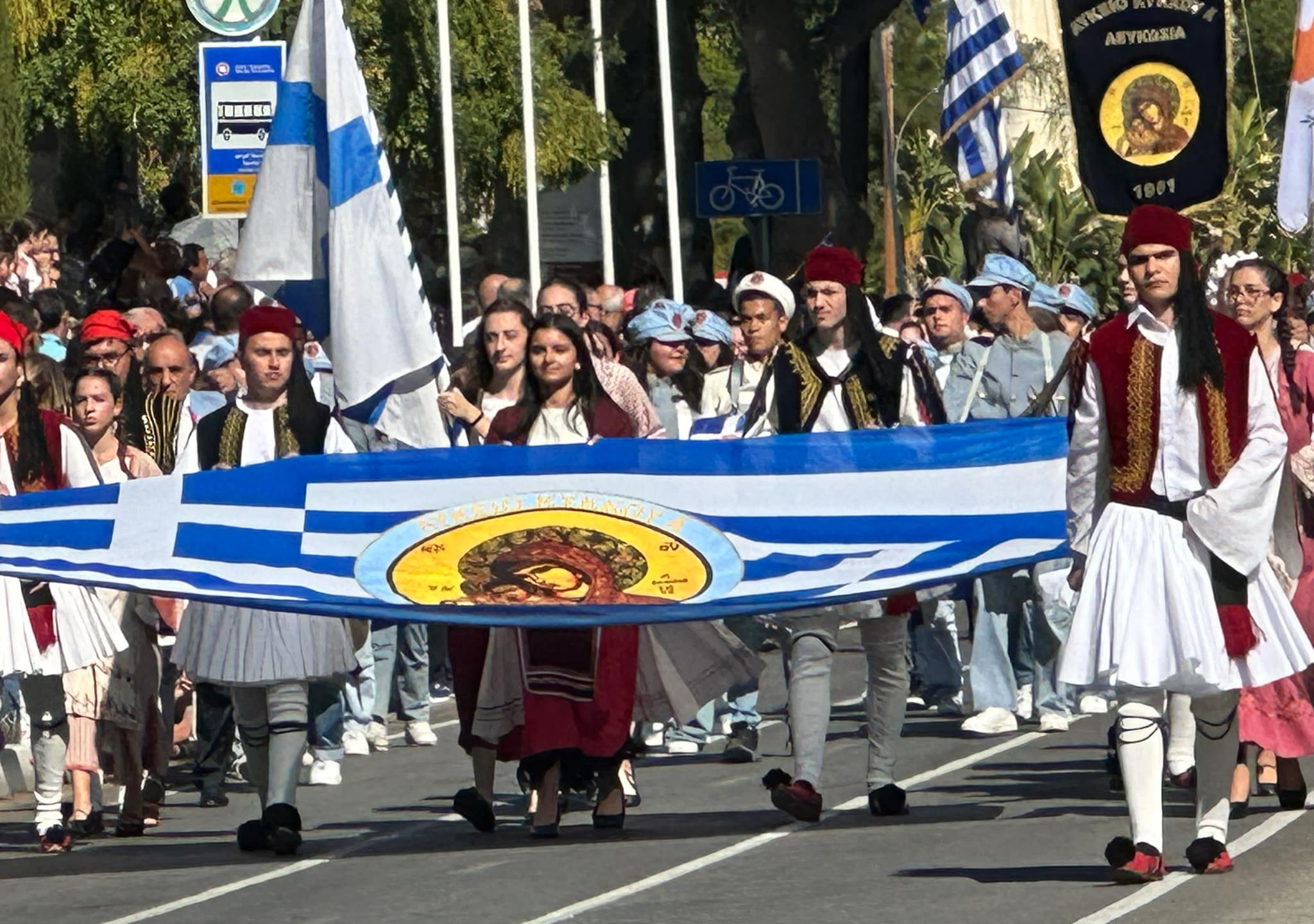Cyprus marked ‘Oxi Day’ on Monday, commemorating Greece’s rejection of Axis forces’ demand to enter its territory on October 28, 1940, during World War II.
In Nicosia, President Nikos Christodoulides, accompanied by First Lady Philippa Karsera presided over a student parade in front of the Greek embassy. Other attendees included Archbishop Georgios, House president Annita Demetriou, the Greek ambassador to Cyprus Ioannis Papameletiou, ministers, party leaders and other officials.
Participants in the parade included the Association of Prisoners of War of 1974, students from both public and private schools, university students, scouts and members of various associations.
Earlier in the day, Christodoulides attended a religious service at Ayios Barnabas Cathedral in Nicosia alongside Education Minister Athena Michaelidou, with the service led by Archbishop Georgios.
After the parade, Christodoulides made statements to reporters, expressing pride in the annual celebration and marking the struggles of the Greek people.
“Happy anniversary to all Greeks everywhere,” he said. “The struggle of the Greeks marked the beginning of the end for fascism and Nazism in Europe and the start of the end of colonialism. However, as I have repeatedly mentioned, we must not focus solely on celebrations and parades.”
He then stressed the importance of the daily struggle, particularly in Cyprus, which this year marked 50 years since the Turkish invasion and ongoing occupation..

“Our goal remains clear: the end of the occupation, liberation and the reunification of our homeland,” he said.
Christodoulides added that since taking office, the government has been working on a specific plan, “which has begun to yield results”.
“I am satisfied with the progress made and I will feel even greater satisfaction when substantive negotiations for resolving the Cyprus problem restart based on the agreed framework,” he said.
Other religious services and parades were held across the island. Following the church service in Nicosia, Christodoulides received the parade salute.
Justice Minister Marios Hartsiotis, who represented the government at Oxi Day events in Paphos, stressed “the duty to honour the heroes of 1940”, highlighting the sacrifices of the Greek and Cypriot fighters.
“Many sacrificed so we can be free today,” he said, adding that about 5,000 Cypriot volunteers fought in World War II.
House president Annita Demetriou called Oxi Day a “symbol of unity and strength that underscores the potential of collective efforts”.
“In a complex and uncertain geopolitical environment, historical memory is more essential than ever,” she said, adding that a fair and sustainable solution to the Cyprus problem remains crucial to national security.
Political parties across Cyprus also commemorated ‘Oxi Day’ on Monday. Disy highlighted the Greek ‘no’ as a stance against fascist-Nazi totalitarianism, drawing parallels to Cyprus’s ongoing efforts for reunification, democracy, and human rights. “We must use the lessons of 1940 to address today’s challenges,” the party said, underscoring the pursuit of a solution grounded in dialogue and UN frameworks.
Akel emphasised the anti-fascist legacy of Oxi Day, paying tribute to Greek resistance fighters and calling for vigilance against modern far-right movements. Edek echoed this sentiment, celebrating the Greek spirit of resistance as an example for Cyprus, and calling for a peaceful, democratic solution free from foreign intervention.
Edek vice president Maria Vasiliadou spoke after the student parade, stressing the values of freedom and dignity.
“Our ancestors fought and gave their lives, saying a resounding ‘no’ to fascism,” Vasiliadou said.
She stressed the ongoing struggle for Cyprus’ liberation and justice, warning against “short-lived solutions” that do not address the deeper issues.
Other parties, including Elam, the Green Party and Dipa, underscored the anniversary as a reminder of the importance of national sovereignty and collective resilience. Elam declared that “there is no room for concessions on issues of national sovereignty,” while Dipa urged Cyprus to look to Oxi Day’s legacy as a model of enduring resistance against oppression








Click here to change your cookie preferences